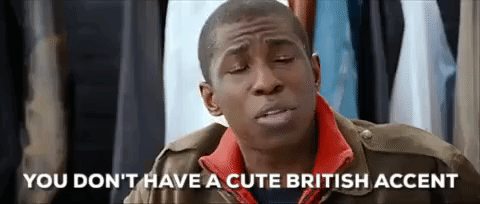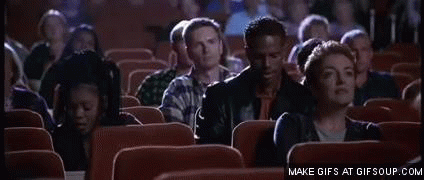Monolingualism in Film: Celebrating English Accents Everywhere
If you’re a Brit watching a Hollywood film, you’re probably used to hearing your accent being butchered portrayed by the villain. It’s not good—there are more accents in the UK than just Queen’s English and Cockney, for example—but there are far worse ways to be disrespectful with a language than replacing one form of English with another.
But why do Hollywood films put so little emphasis on the other languages of the world, even if it is just a form of English that isn’t American? And why, when they do have another language as an important part of the plot, do they often not use the language at all, only badly-accented English to depict it? Take a walk on the wild side with us as we dive into the heart of Hollywood’s multi-accented English performances, including the good, the bad, and the ugly.

Table of Contents
GIF via Giphy
The good
Don’t get us wrong, there are some beautiful films with great use of non-English playing a pivotal part in the story. We have what feels like every film Viggo Mortensen ever touches, some examples being Russian in Eastern Promises, French in Far from Men, and Spanish in Everybody Has a Plan (and yes, also both Quenya and Sindarin Elvish in Lord of the Rings).
Black Panther, while not using the language extensively throughout the film, had many of its cast speaking Xhosa as the language of fictional Wakanda. The Arrival used a non-verbal language with its alien invaders that was so realistically done, even the linguists amongst cinema-goers were impressed! And there’s also Inglourious Basterds, who had both Michael Fassbender and Christoph Waltz speaking German.
The bad
Okay, so we know it’s a thing at the minute to hate on Jennifer Lawrence, but our criticism here is purely a linguistic one. Her accent in Red Sparrow attempting Russian is, well, at least she gets points for trying! We’re just not sure what accent it is.
Though perhaps it’s a Russian thing, since Sean Connery also fumbled the accent in The Hunt for Red October—though at least he tried a few Russian words, which is more than we can say for Ms Lawrence.
Juliette Binoche in In My Country did little more than attempt to recreate an Afrikaans accent with a side of French, and not a word in actual Afrikaans at all!
Take a look at dialect coach Erik Singer as he analyses several classic Hollywood film actors and their performances here:
Learning a new language? Check out our free placement test to see how your level measures up!
And if we’re looking at just bad English accents rather than crimes against other languages, we can look to both Anne Hathaway and Josh Hartnett in One Day and Blow Dry respectively for what they did to the Yorkshire accent. Tom Cruise (Far and Away), Gerard Butler (PS I Love You), and Brad Pitt (The Devil’s Own) did equally unspeakable things to the Irish accent in each of these films. And Michael Caine attempting to convince us he was Texan in On Deadly Ground mostly just left us confused.
And now for the ugly
…or maybe not ugly, exactly, but something that leaves a bad taste in our mouths. If multi-million dollar blockbusters from Hollywood can either recreate foreign climes to perfection in locations closer to home, or spend a fortune shooting their films on location all over the world and get everything from cuisine to clothing right, what is the issue with not speaking an actual, foreign language on screen?
It isn’t as though we don’t have celebrities who are at least bilingual and could easily switch from one language to another on screen. Sandra Bullock and Diane Kruger both speak German, and Jodie Foster and Joseph Gordon-Levitt both speak French. We also have Charlize Theron who speaks Afrikaans, and Mila Kunis who speaks Russian as just two more examples; in other words we have no shortage of familiar faces who can already speak more than one tongue.

GIF via Giphy
So, reasons for not using foreign languages? Could it be fear that an American audience won’t enjoy not being able to understand what’s happening without subtitles—and don’t particularly like subtitles in the first place?
Is it because there is little exposure to foreign media in America for cinema-going audiences and film producers don’t want to rock the boat? Is it laziness, a general sense that everyone speaks English, or just to appeal to as wide an international market as possible? Or is it even worse, a dumbing-down culture that acts as though the average American can’t think outside the monolingual box and wouldn’t cope with something so very different to their own tongue?
We are not sure, and neither are we Hollywood movie makers; more’s the pity, since we would likely force a multitude of languages onto our screens! But we do think there is room for Hollywood and other film industries to push beyond the scope of monolingual film making. If we want to understand our world and all the people in it, surely we should hear what they have to say—in all the languages they speak!


